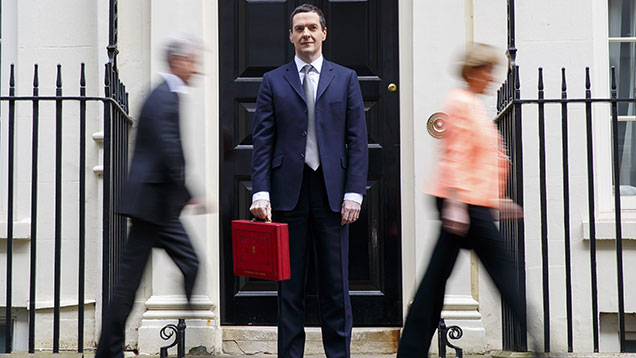What farmers need to know about the Budget
 © Tolga Akmen/LNP/REX
© Tolga Akmen/LNP/REX Here is a run down of the main points for farmers in Wednesday’s (18 March) Budget. It remains to be seen whether they survive the post-election budget in just a few weeks’ time.
Farming profits
… can be averaged over five years (currently this can be done over only two years), to smooth the tax impact of volatile profitability. Useful only if there are really big fluctuations, say accountants. Estimated by the government to potentially save farming £30m/year.
Annual investment allowance
… is to be substantially more generous than the £25,000 to which it was set to drop from January 2016. But we have to wait until the Autumn Statement to learn the new rate – much too late for proper planning, say accountants and lenders, particularly when some kit has a lead time of several months.
See also: Development opportunities need careful tax planning
Deeds of variation
… are to be reviewed in summer 2015. These effectively allow a family to alter a will after death to make the distribution of the estate more tax efficient, as long as all beneficiaries agree to the change.
The review means any such deeds should be put in place before the summer, say advisers. Also, wills should be reviewed so that if deeds of variation are no longer an option, the wills work as they should.
Enhanced capital allowances
… will be available on a longer list of energy-saving and water-efficient technologies in summer 2015 – the list currently includes solar thermal equipment, pipework insulation, boilers, lighting, combined heat and power and many others.
Compulsory purchase law
… is to be reformed to make it clearer, faster and fairer – called for by many but don’t expect a swift or a wholesale change. The brief details contained in the Budget documents are already giving rise to criticism because blight appears not to be included in the review.
Annual tax returns
… to be replaced by digital tax accounts – with the experience of the BPS claim system, many are asking whether this is a good idea. It should mean less work because certain information such as earnings (for those on PAYE) will already be shown on the digital tax accounts which will be created for individuals.
Entrepreneurs’ relief
… from capital gains tax is to be tightened – new rules on limits disposed of and those where associated business are involved.
National Insurance (NI)
… class 2 rate for the self-employed will be scrapped in the next parliament, class 4 NI contributions on trading profits reformed to introduce a new benefit test, no NI for under 21s from April this year and no NI for young apprentices from April 2016.
Fuel duty
… frozen from September, the next date that a rise was due to take effect.
Tax on savings income
… will be charged only after the first £1,000 of interest (£500 for higher rate taxpayers).
Income tax personal allowance
… to rise to £10,800 in 2016-17 and £11,000 the year after.
Higher rate tax threshold
… rises to £42,385 in 2015-16 and £42,700 and £43,300 in the two following years.
Pensions Lifetime Allowance
… on contributions slashed by £250,000 to £1m from 6 April 2016.
VAT registration threshold
… increased from £81,000 to £82,000.
Small business rate relief
… extended for a further year, to 31 March 2016 so that properties with a rateable value of £6,000 or lower get 100% relief. Rateable values between £6,001 and £12,000 will get relief tapered from 100% to 0%.
